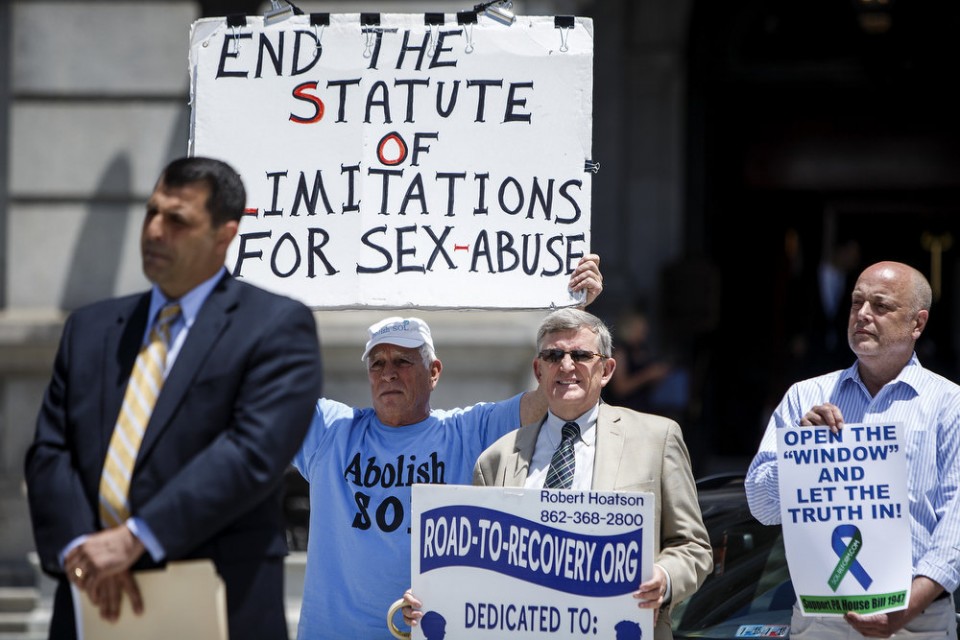Arguments on Constitutionality: the Main Points out of Senate Hearing on Statute of Limitations Reform Bill
By Ivey DeJesus
In a three-hour long hearing steeped in references to Pennsylvania case law, the Senate Judiciary Committee on Monday heard expert testimony on the validity and viability of proposed legislation that would change how child sexual predators are prosecuted. The hearing, which tipped markedly in favor of opponents of House Bill 1947, was held in a hearing room packed with victims advocates as well as past victims of sexual abuse. Many of them wiped away tears as a cadre of expert witnesses – with the exception of one – argued how the Pennsylvania Constitution prohibits the General Assembly from retroactively altering expired statutes of limitations. The hearing, which featured five expert witnesses, only one testifying in support of the bill, focused on the constitutionality of the bill, which would impose look-back measures for past victims of abuse, including those molested by priests as children. Much of the testimony centered around the state's constitutional remedies clause, which ostensibly bars the General Assembly from retroactively altering expired statutes of limitations. Prior to the experts giving their testimony, Attorney General Kathleen Kane, who in March released findings of a grand jury report that found systemic child sex abuse over decades in the Altoona-Johnstown Diocese, delivered a short appeal. Kane, whose law license has been suspended in the wake of criminal charges stemming from the grand jury leak investigation, begged the panel to pass the bill immediately. "I'm asking you to do that because every single day that goes by... is a day more and more and more victims are denied justice," she said. Kane said that if after approval of the bill,the Senate found that it violated the state's Constitution, lawmakers should "figure out a solution" to the constitutional issue, whether that meant amending it "or whatever needs to be done but make firm commitment" to finding a way that "we are never denying justice to anyone in the Commonwealth." "We as government will prove by our actions that we support child survivors and their families and not cruel, cold-hearted criminals who prey upon our criminals," Kane said. "We will not protect the institutions that harbor them." In contrast to Kane's opening remarks, the witnesses who followed reiterated respective arguments that the bill would not pass state Constitutional muster. Coming on the heels of Kane's short appeal, the second-highest ranking official in her office, Bruce Castor, the solicitor general, testified that the bill would violate the remedies clause of the state's Constitution, and therefore, prove to be unconstitutional. "House Bill 1947, if enacted into law in its current form and without amendment will, in our opinion, violate the remedies clause of the Pennsylvania Constitution," Castor argued. "Potential defendants, who have had the statute of limitations pass without their being subjected to suit, will rightly claim a vested right in the applicable statute of limitations." Castor said that while the bill represented "a laudable attempt to provide a remedy for a well identified social problem", the the General Assembly "in its zeal, cannot overrule a state constitutional right." Castor based his conclusion in large part on a 1908 case involving a retroactive claim. In Lewis v. Pennsylvania Railroad Company, the state Supreme Court ruled against the widow of railroad worker who had filed a negligence claim retroactively against the company. The court, Castor said, had concluded that "retroactive legislation that reduces a defendant's defenses or "exemptions from demands" cannot be applied where the defense has "vested." The state's remedies clause states that "all courts shall be open; and every man for an injury done him in his lands, goods, person or reputation shall have remedy by due course of law, and right and justice administered without sale, denial or delay. Suits may be brought against the Commonwealth in such manner, in such courts and in such cases as the Legislature may by law direct." House Bill 1947 came in the wake of the Altoona-Johnstown Diocese grand jury report as a groundswell of advocates called for reform in the law. The bill, which was approved in the House by a 180-15 vote, would eliminate all criminal statutes going forward on most child sex crimes and retroactively amend civil statutes. The bill would retroactively extend civil statutes that expired at a victim's age 30 to 50. Castor was followed by three other speakers - all of them law experts - who reiterated his stance that the bill would violate the state's remedies clause.
Citing a handful of case law, Bruce Antkowiak, a law professor at Saint Vincent College, argued that the U.S. Constitution has permitted the revival of expired statutes of limitations in cases where legislatures have explicitly made that determination in the matter before it. Antkowiak argued that while House Bill 1947 would likely pass federal Constitutional muster, it would fail at the state level. Pennsylvania's Constitution, he argued, has been consistently interpreted to reject the legitimacy of revival of expired claims. Unless the General Assembly undertook "a dramatic reversal of established jurisprudence in the area" or passed a Constitutional amendment, the proposed bill "will fail a Constitutional challenge in the Courts of the Commonwealth." "If the bill is passed as is, there will certainly be a legal challenge," Antkowiak said. Cary Silverman, an attorney who testified on behalf of the Pennsylvania Catholic Conference and the Insurance Federation of Pennsylvania, reiterated that line of thinking. Silverman argued that Pennsylvania law has been "consistent and unequivocal" on the merits of reviving a civil claim for which the statute of limitations has expired. The Pennsylvania Catholic Conference, the church's legislative branch, and the insurance industry, along with the business sector, argue that the retroactive components of the law are unfair and would be detrimental to their interests. Silverman pointed out that while "most states" have not revived time-barred claims, Pennsylvania's constitutional law regarding vested rights is consistent with the approach taken by "most states," leading them to apply extensions of the statute of limitations prospectively, not retroactively. More than two hours into the hearing, supporters of the bill had their expert witness called to testify. Marci Hamilton, a constitutional law expert and one of the country's leading experts on statutes of limitations, said that given the fact that opponents of the bill had ostensibly been given more than two hours to testify, she would break her protocol and read her full testimony. "I haven't done that ever in my career," said Hamilton, who began her testimony summarizing what the basic points she and victims and other advocates had heard during the morning, including that "bishops fully plan on dragging victims through a constitutional challenge if the statute of limitations is revived." Her voice piqued with frustration, Hamilton registered her objection that the prosecutors involved in grand jury reports into church dioceses had not been asked to testify. "It is unfortunate that prosecutors who worked very, very hard on grand jury reports and whose lives changed by learning of this abuse were not permitted to testify," Hamilton said. "All asked to testified and were not permitted." Hamilton then went on to make a case for the constitutionality of House Bill 1947, arguing in specific, that the state Supreme Court had not heard arguments on the issue. "The Supreme Court has not ruled on this," she told the panel. "You don't know what the Pennsylvania Supreme Court will do. I don't understand how this committee would know if it's unconstitutional if the Supreme Court has not ruled on it yet." Hamilton argued that House Bill 1947 did not violate due process under either state or federal law. Revival of expired civil statutes of limitations are constitutional if two due process requirements are met: clear legislative intent and the change is to a procedural element - like a statute of limitations. At the state level, Hamilton argued, the state high court has permitted the retroactive application of statutes similar to those in HB1947, distinguishing between procedural and substantive retroactive changes in the law. Under the proposed legislation, Hamilton said, "mere alteration of a statute of limitations does not violate due process in Pennsylvania." She added that Pennsylvania was in line with the "majority of states, which have not found that defendants have a vested right in expired statutes of limitations." Hamilton further argued that the state's remedies clause protected the injured not those who caused injury. She said the Catholic Church and its powerful lobbying might had "fallen back" on the idea that the remedies clause barred revival of expired statutes in order "to protect tortious defendants." "The purpose of the remedies clause is to protect plaintiffs from legislative action that will undermine the existence of an individual's remedy for an injury done," Hamilton argued. "It is a constitutional guarantee of open courts for plaintiffs, and not a shield to block courts access in favor of powerful defendants." At the conclusion of her testimony, Sen. John C. Rafferty, addressing Hamilton, said it was incumbent on the committee to consider the legislation before it. He said should issues of constitutionality arise, it was best left up to "people in black robes." The chairman of the committee, Sen. Stewart Greenleaf, R-Montgomery County, said he hoped his committee would rule on the bill before the summer break. "Now that we've heard testimony of witnesses in regards to the constitutionality, we can move ahead with that issue," Greeleaf said. "Members of my committee have to decide and absorb the information that they just heard and make a decision on that issue." Greenleaf said his chamber could always amend the bill, if there was a question of constitutionality on the retroactive measure. "We can take the provision out of the bill and move the bill without that provision," he said. "But this is the first time they've heard this information. I'm going to have to talk to my members." idejesus@pennlive.com
|
.
Any original material on these pages is copyright © BishopAccountability.org 2004. Reproduce freely with attribution.

